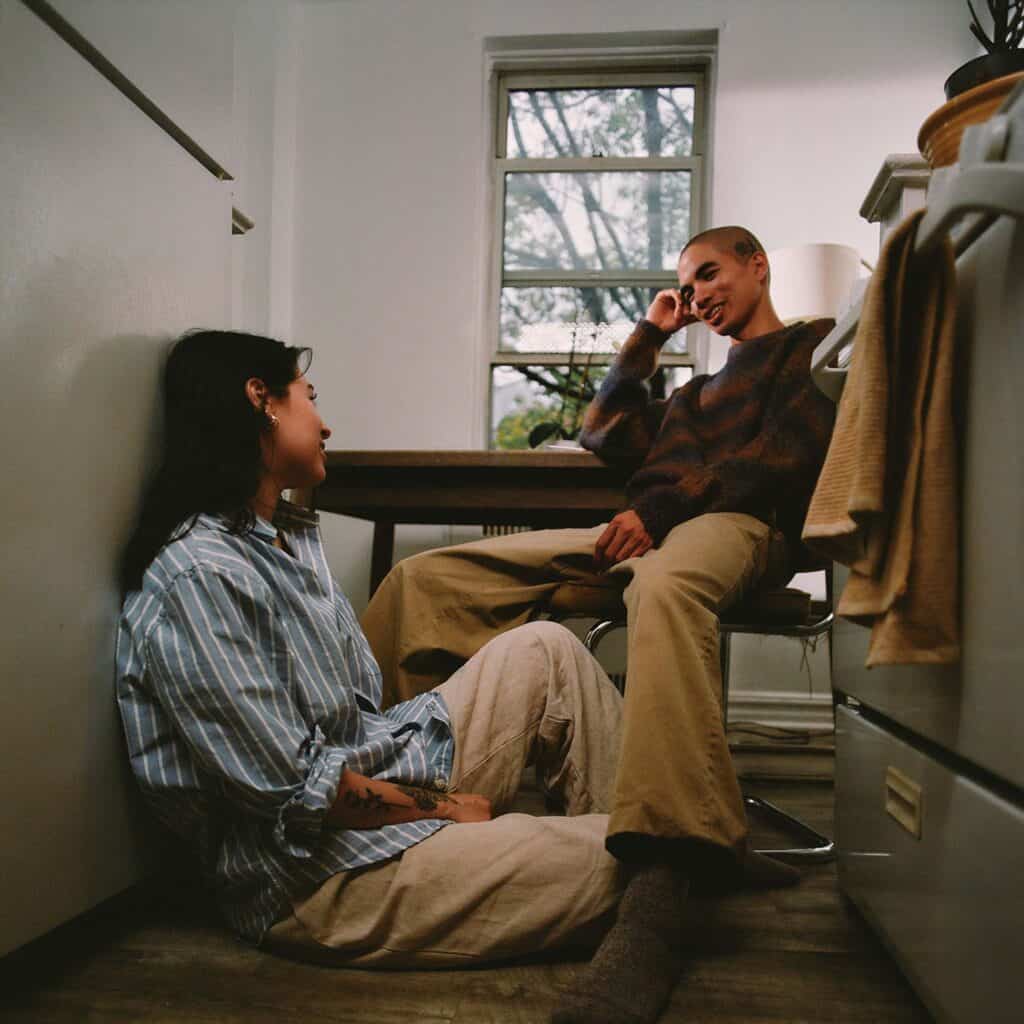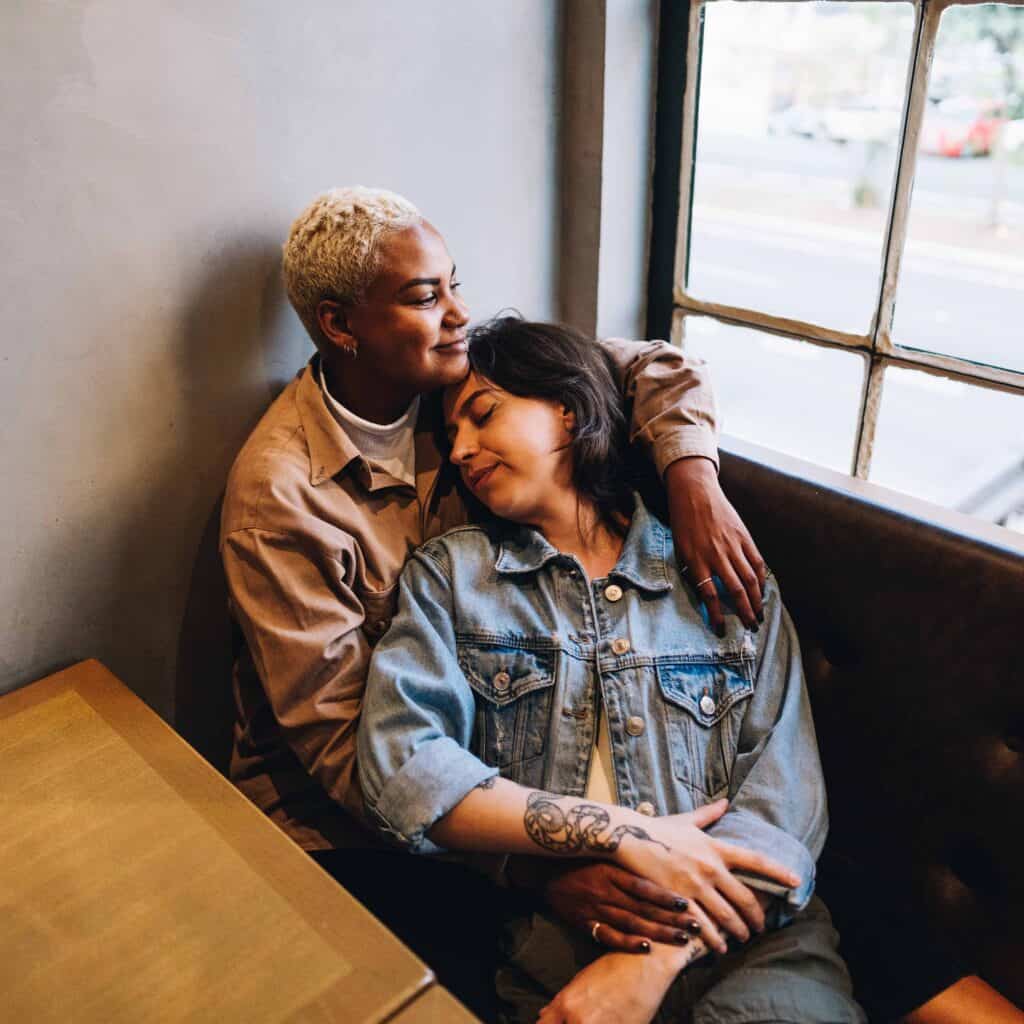Relationship wellness
In love vs. love: What’s the difference?
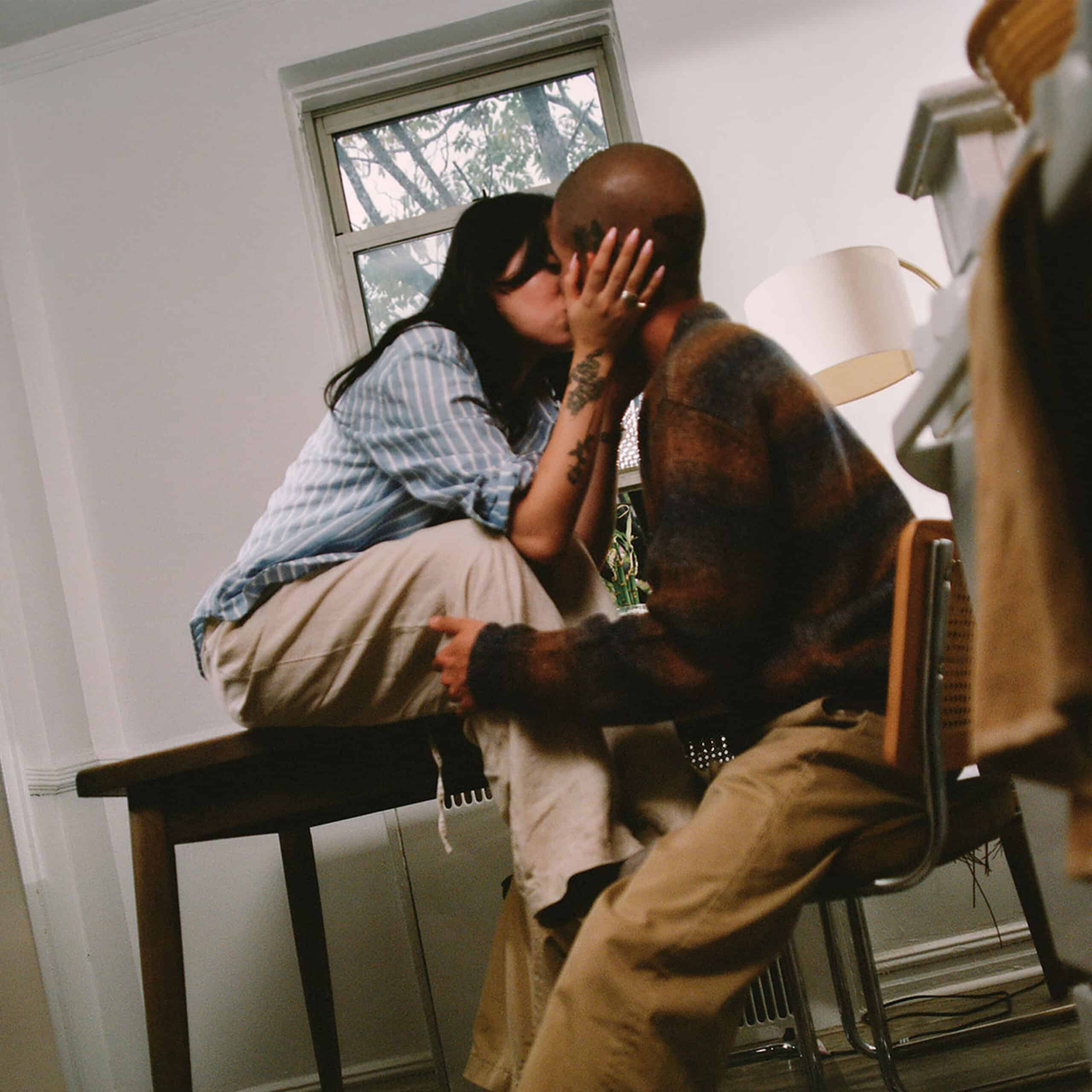
contents
When it comes to romantic relationships, there’s a difference between loving someone and being in love — but how do you distinguish between the two?
Love is a driving force in relationships. It involves feelings of trust, compassion, and closeness. There are many types of love — you may love your romantic partner, parents, friends, and pets in different ways. In fact, ancient Greek mythology developed eight different words to distinguish between the different types of love.
Understanding the differences between types of love is important in relationships, especially when distinguishing between the feeling of butterflies when you’re in love and the emotional depth of loving someone.
Many people in couples therapy aren’t aware that being in love with someone is different from truly loving them. While being in love often leads to feelings of desire and passion, love is a broad term that emphasizes a deep understanding and acceptance.
In this article, we’ll dive into the key differences between being in love vs. love. We’ll also discuss the benefits and drawbacks you may experience when loving someone.
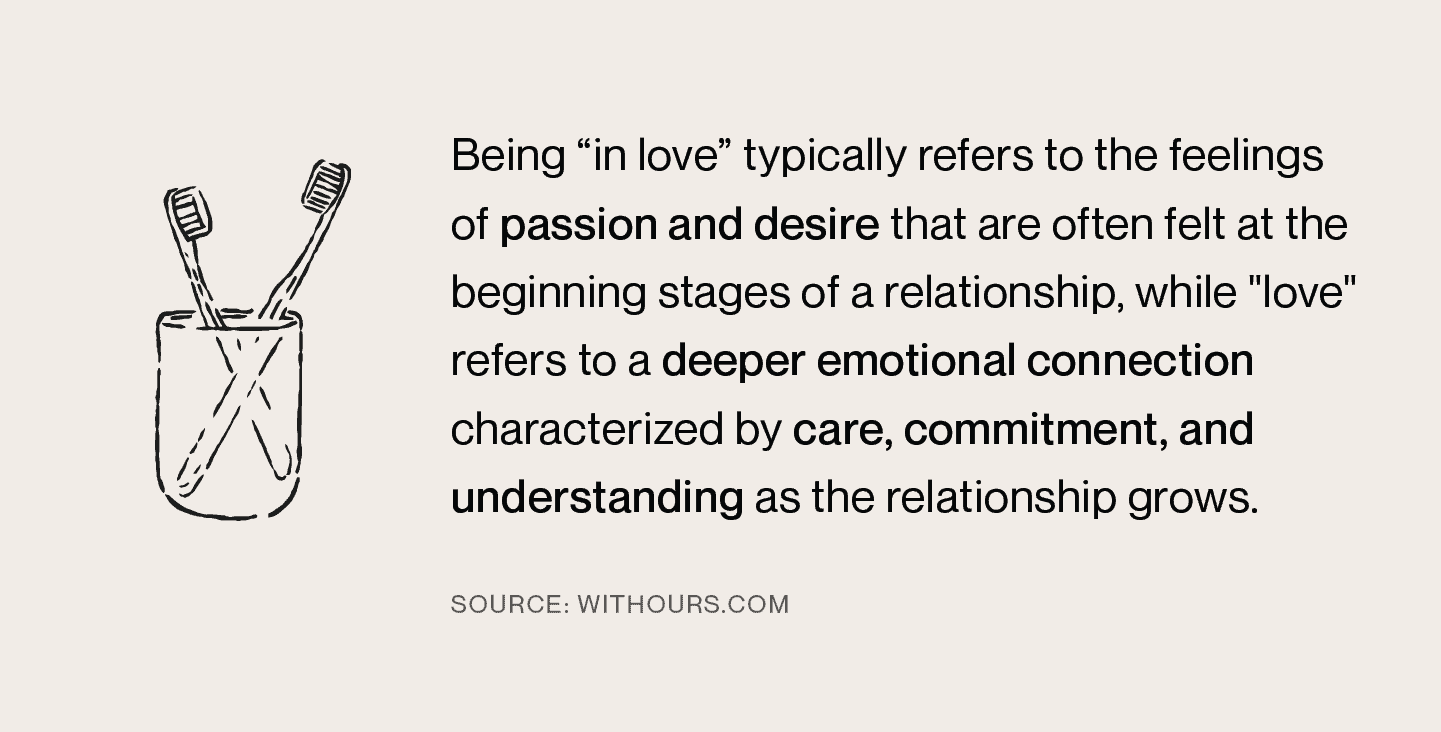
1. Temporary vs. permanent
Falling in love can be a temporary feeling at the beginning of a relationship, also known as the “honeymoon phase.” During this time in a relationship, the couple is generally carefree and happy due to the excitement of the new romance.
The honeymoon phase is described as a “phase” because the feelings of being in love can be fleeting and tend to fade over time. However, that doesn’t mean they’re gone forever — the feeling of being in love tends to ebb and flow throughout a lasting relationship.
On the other hand, love is a permanent feeling that endures in a long-term relationship. When you love someone, this feeling is often deeply ingrained — it will remain even if your partner irritates or upsets you. This is why some individuals feel they will love an ex-partner forever, even if they aren’t in love with them anymore.
2. Possession vs. partnership
When you’re in love with someone, you may feel a strong desire to hold onto that person for yourself. This can cause you to become overly protective of your new love and feel threatened or jealous when they give attention to others. If being in love tends to spark feelings of possessiveness, take steps to overcome this to maintain a healthy relationship.
As you move into a mature love, a partnership begins to form within your relationship. Instead of feeling jealous, you feel confident that you and your partner are on the same team. Here are some signs that your relationship has become a true partnership:
- You and your partner have shared goals
- You and your partner are committed to each other
- You and your partner contribute equal effort to the relationship
- You and your partner communicate openly and honestly
3. Sexual desire vs. intimacy
When you’re in love with someone, you may feel a strong sexual desire. Sexual intimacy allows you to connect with your partner and share moments of pleasure. Because of this, sex may play a major role in your relationship during this time.
Love, on the other hand, goes a step further. While sexual intimacy is still important, you will also engage in other forms of intimacy such as the following:
- Physical intimacy: Connecting with your partner through physical touch. Examples of physical intimacy include cuddling, holding hands, and massaging.
- Emotional intimacy: Expressing feelings and emotions with your partner in a way that feels safe and trustworthy and requires a level of vulnerability. Examples of emotional intimacy include engaging in honest conversations about the relationship, showing empathy when your partner is going through a hard time, and opening up about past experiences.
- Intellectual intimacy: Discussing thoughts and ideas with your partner in a way that enriches both of your minds. Examples of intellectual intimacy include engaging in deep conversations, respectfully debating opinions, and learning new things together.
- Spiritual intimacy: Creating a connection with your partner through shared beliefs and core values. Examples of spiritual intimacy include praying together, connecting through nature, and exploring existential ideas.
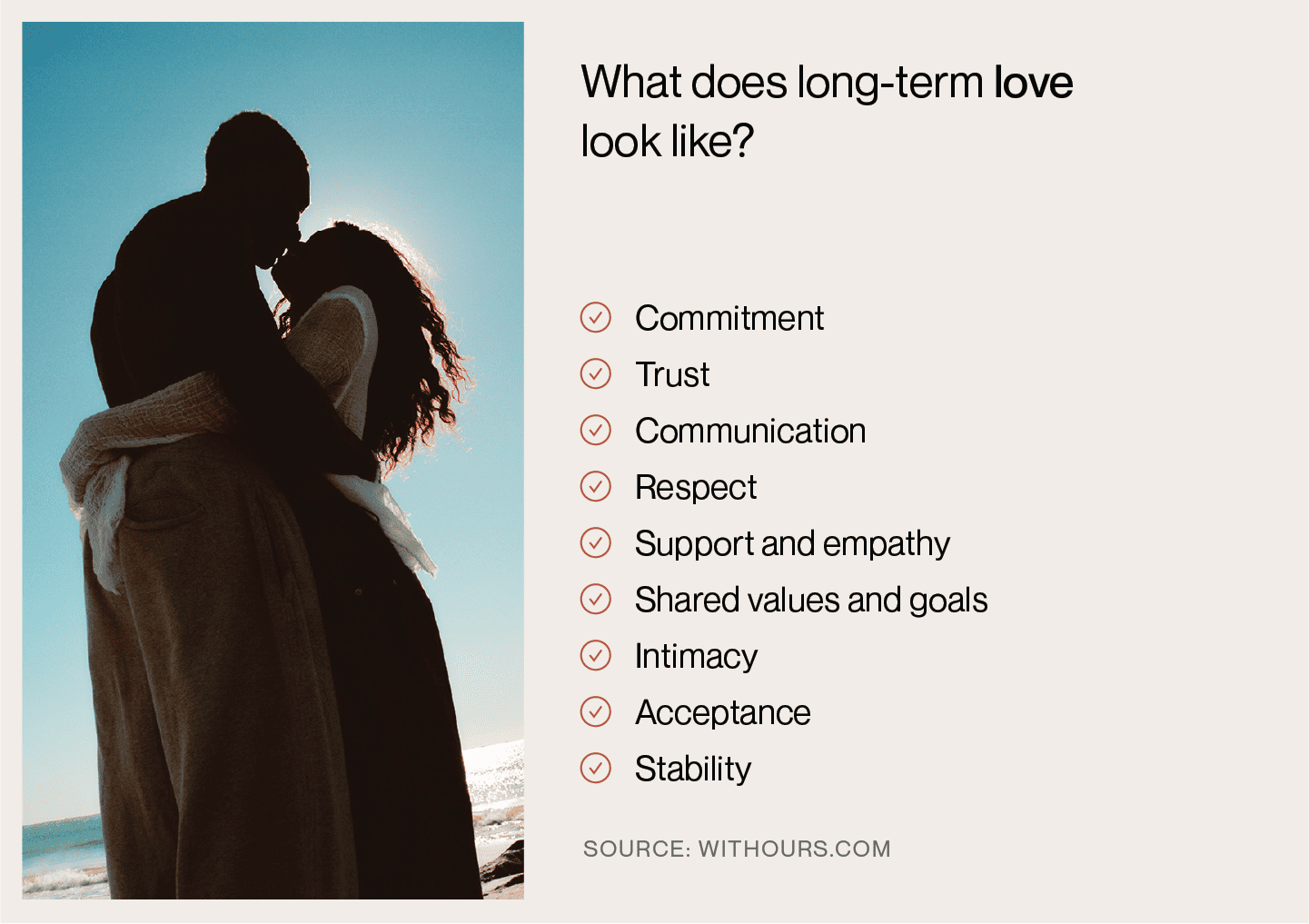
4. Changing vs. accepting
During the beginning stages of a relationship, you may change things about yourself to fit what you think your partner wants. For example, you might hide imperfections or tone down your personal quirks.
However, when there is true love between you and your partner, you won’t feel the need to change for them. You will feel comfortable showing up as your true, authentic self. You have trust that your partner will love you despite your flaws since they recognize that your imperfections are what makes you unique.
5. Infatuation vs. stability
The first stage in a relationship is the infatuation stage, where both partners experience an intense admiration or interest in each other. Infatuation can feel almost immediate, and it’s what people often refer to as “love at first sight.” During this stage, you may have an idealized view of your partner and fantasize about your future with them.
As your relationship stabilizes, an attachment begins to form. Over time, you’ve gotten to know your partner, and you’re confident in your ability to work through conflict together. Instead of the butterflies you experienced during the infatuation stage, you may feel calm and secure in the presence of your partner.
While a stable relationship is good, some couples mix up the comfortable feeling with predictability and boredom. To counteract this, consider mixing up your routine and trying new things to bring excitement back into your relationship.
6. Avoiding conflicts vs. understanding disagreements
When you’re in love with someone, you may avoid conflicts out of fear of the relationship ending. You may feel anxious about discussing problems and sweep them under the rug instead.
However, conflict is a healthy part of any intentional relationship. When your relationship morphs from in love to mature love, you’ll likely feel more capable to effectively communicate about issues with your partner. You’ll trust that you can work through problems with your partner and come to agreements or compromises. You’ll no longer fear that a disagreement or problem will cause the relationship to suddenly end.
7. Dependence vs. independence
When you’re in love with someone, you may heavily rely on their presence for happiness and attention. You may even feel lonely or lost when that person isn’t around. While being moderately emotionally dependent on your partner is normal, it can also be a sign of an unhealthy attachment.
Love balances spending time with your partner with nurturing your individuality. Independence allows you to focus on your own needs and grow into the best version of yourself.
8. Staying together vs. moving apart
When you’re in love with someone, you deeply desire them in your life. This type of love has the potential to become selfish, especially when you focus on your own wants and needs over those of your partner.
Ever heard the phrase “If you love something, set it free”? This can apply to relationships. Sometimes, loving someone means wanting them to be happy, even if that isn’t with you.
On the other hand, truly loving someone also means working through and overcoming challenges. While those in love can easily fall out of love when they encounter problems, deeply loving your partner motivates you to work through them.
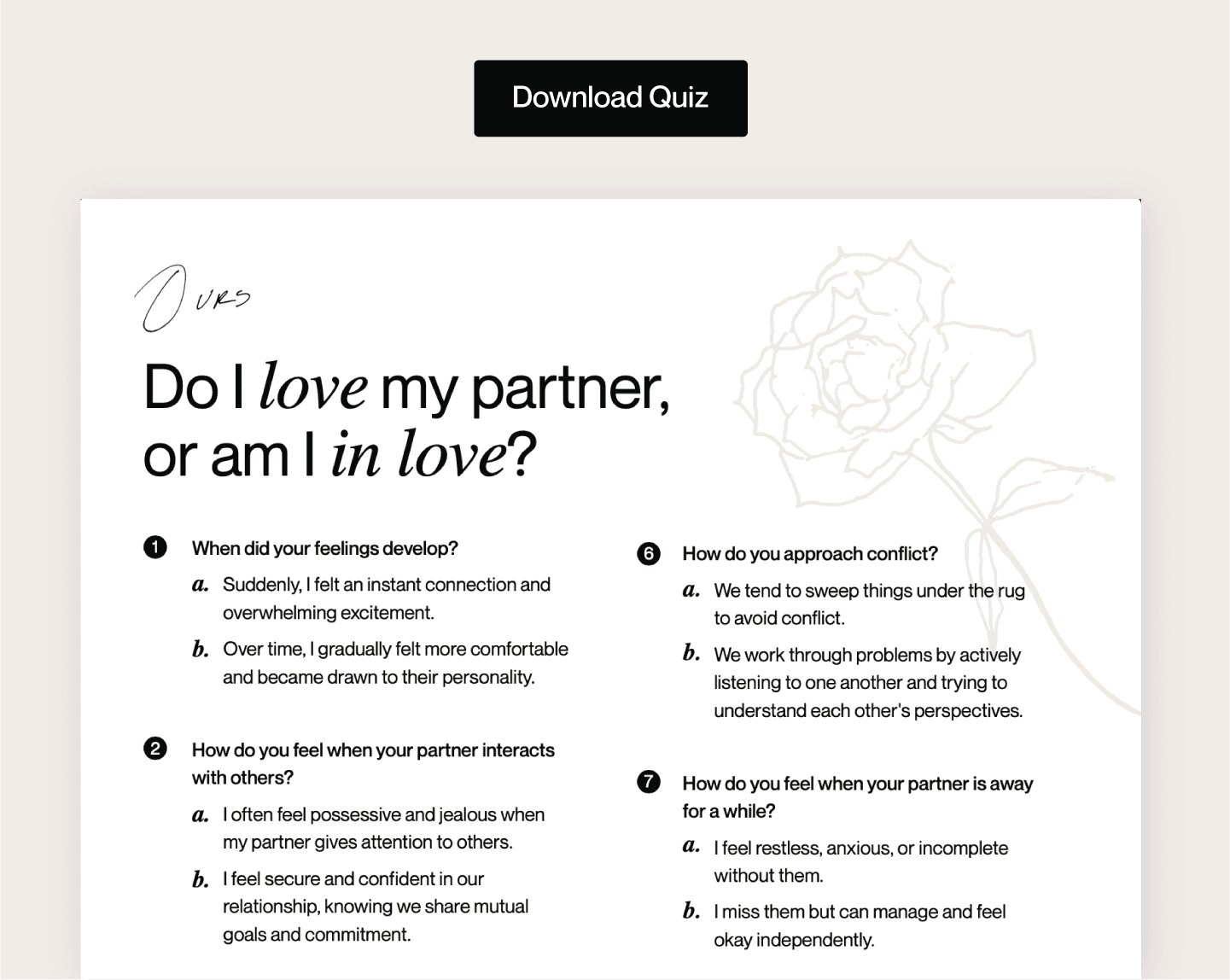
What are the benefits of loving someone?
Loving someone can have a myriad of both mental and physical health benefits. Below are a few of the top benefits of being in love.
Increased happiness and sense of belonging
Falling in love can lead to feelings of joy, happiness, and euphoria. This is because your brain releases dopamine (the “feel-good” hormone) when you fall in love. Dopamine is a neurotransmitter that plays a role in the body’s reward system that leads to feelings of pleasure.
Being in love also creates a sense of belonging, which benefits mental health. In fact, a 2023 study revealed that a sense of belonging significantly promotes overall well-being.
Decreased stress and anxiety
Do you ever feel like your problems just melt away when you’re with someone you love? That’s because love has shown to decrease stress and anxiety.
As your attachment grows with the person you love, the bonding hormone oxytocin is released alongside dopamine. Scientific studies have shown that oxytocin has stress-reducing effects, such as lowering blood pressure and cortisol levels. While falling in love often causes the stress hormone cortisol levels to initially spike, the hormone decreases as you enter into long-term love.
Increased life expectancy
Did you know that love may help you live longer? A 2022 study published in the Journal of Personality and Social Psychology supports this idea. The study showed that positivity resonance, or moments of positive emotional connection, in long-term relationships led to increased longevity among participants.
What are the drawbacks of being in love?
It’s important to remember that love isn’t always sunshine and rainbows — there are some disadvantages to be aware of.
Love takes work
You may have heard people refer to marriage as “hard work.” While falling in love can come effortlessly, maintaining a long-lasting love takes effort. Doing the work in a relationship can look like the following:
- Putting effort into understanding your partner during disagreements
- Making sacrifices for the good of the relationship
- Attending couples therapy
- Prioritizing quality time with your partner even when you have a busy schedule
- Being willing to compromise to come to a solution
- Performing small acts of kindness regularly
Love requires consistent effort from both partners to continue to build and nurture the relationship.
Increased vulnerability
Love requires intimacy and vulnerability, which opens you up to the potential of emotional pain and heartache if it doesn’t work out. Whenever you love someone, there is always a risk you will get hurt. Try not to let this hold you back from creating meaningful romantic relationships.
Fall in love with Ours
While the key differences we discussed can help you distinguish between being in love vs. love, remember that every relationship is different. Some people fall deeply in love with their partner at the beginning of a relationship, which then evolves into a deeper love. Others may love their partner as a friend for years before they fall in love with them.
The evolution of being in love with your partner to living with them isn’t always a bad thing. It’s normal for the excitement and passion to fade with time and be replaced with a mature, long-lasting love.
Last but not least, remember that these terms aren’t mutually exclusive. A great relationship involves both being in love with your partner and loving them. If you feel like your relationship is missing one of these types of love, consider working with a couples therapist to discuss ways to reconnect.
Sign-up today to get started.



